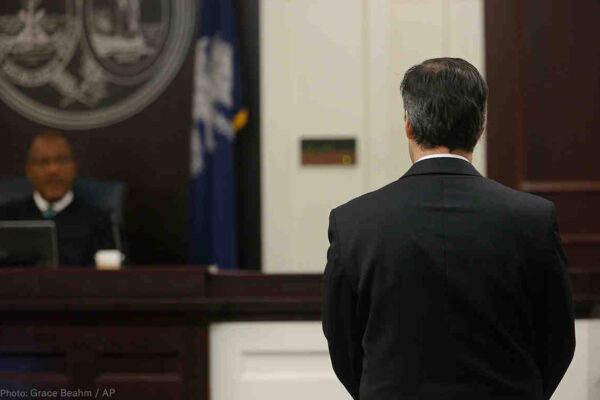Police officer Michael Slager shot and killed an unarmed Black man, Walter Scott, in 2015, and it was all caught on video. Today he was sentenced by a federal judge to 20 years behind bars for violating Scott’s civil rights. While this instance of accountability in a police killing is heartening, the fact that it is a surprising result tells you what you really need to know about police reform. The accountability of police to the communities they serve is still elusive in many places, and nonexistent in some.
Officer Slager was shown shooting Scott in the back while Scott ran away. Yet even with that video evidence, his first trial in state court resulted in a hung jury. Slager’s pleading guilty to federal charges and now being sentenced for the murder of a Black man is the exception to the rule. Usually there are no charges. Or there is no conviction. There are myriad cases, from Alton Sterling in Louisiana to Philando Castile in Minnesota, where video evidence was not enough.
Police officers often invoke the “fear” they felt in the moment. The fear they, as armed, powerful and body-armor-wearing officers, felt in the presence of a Black person running away, or selling loose cigarettes, or driving a car, or playing with a toy gun. Officer Slager invokes that fear, claiming that Scott was reaching for his Taser.
The fear that is not addressed is the fear felt by Black and Brown people who are routinely subject to police discrimination and brutality. This is a fear that needs to be addressed with nationwide police reforms that include more comprehensive training that allows the use of force only when necessary and promotes de-escalation techniques to keep people and officers safe during their interactions.
While the Slager case is a victory, it is not a solution. The ACLU of South Carolina, the NAACP Legal Defense Fund, along with local NAACP offices and community organizations have repeatedly asked the federal government to step in and review the North Charleston Police Department, which has a recorded history of racially motivated policing. Such a review could address implicit bias and end racialized policing, and help to ensure that those who are charged with protecting communities fulfill that duty.
The ACLU of South Carolina along with other community agencies has been working to obtain an independent review of the North Charleston Police Department’s patterns and practices when it comes to dealing with minority communities. Numerous town hall meetings have been held in order to obtain data from the residents of North Charleston about their interactions with the police.
In sentencing Slager, Judge David Norton said he “acted out of malice and forethought.” That Walter Scott was another Black man gunned down by police matters. We need police practices in South Carolina to change and we need these same policing reforms across the nation. We know that these reforms must come from within communities. This is especially true now, with a Justice Department that has shirked oversight of law enforcement. The police need to know that the people are watching, and that they will not tolerate police criminality that results in the killing of people they are supposed to serve.



